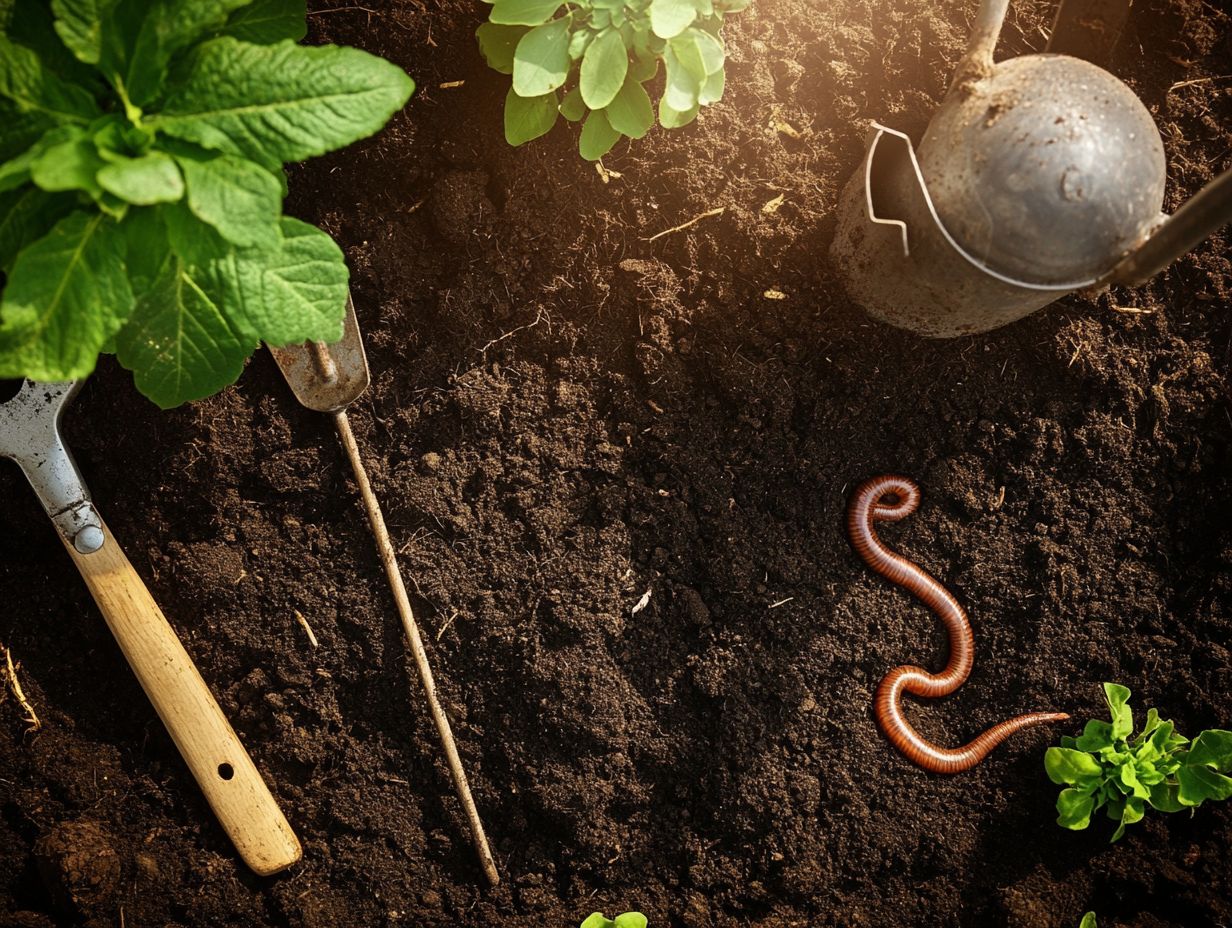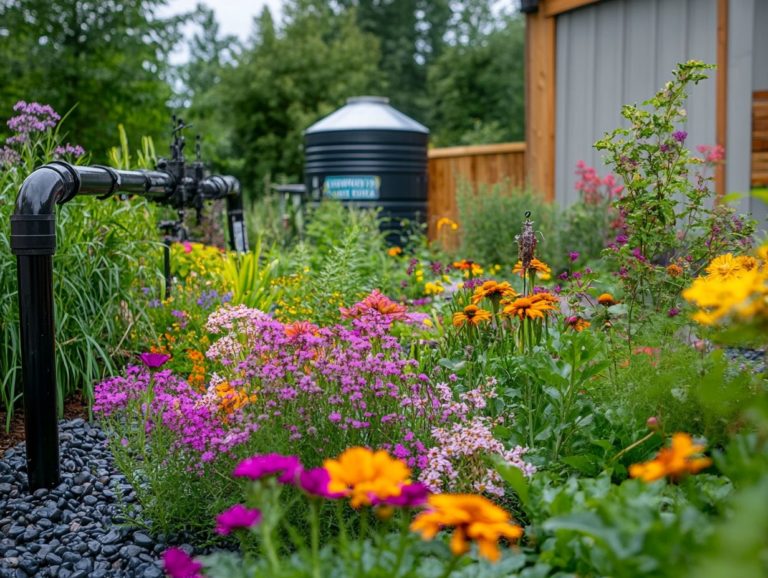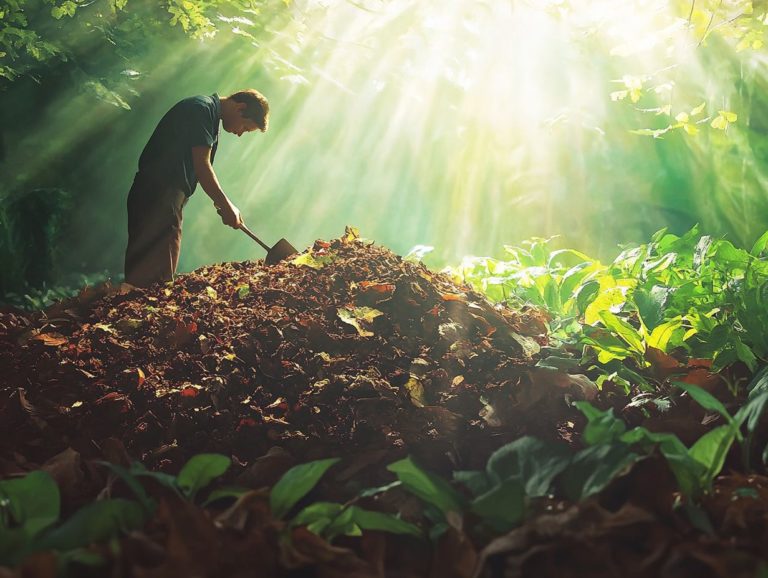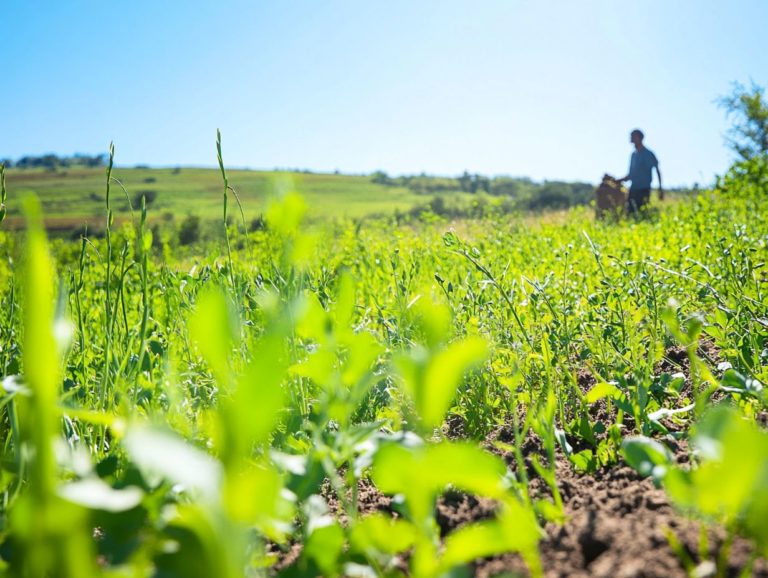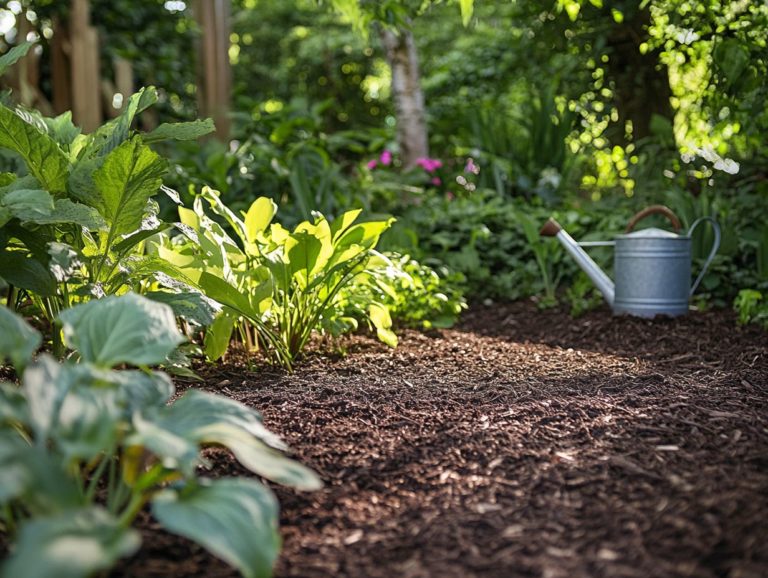Best Practices for Maintaining Garden Soil Health
Soil health is crucial for a thriving garden, affecting everything from plant growth to nutrient availability. Get ready to discover why healthy soil is essential for your garden s success!
This article delves into the importance of healthy soil and guides you on how to recognize signs of deterioration. You ll uncover effective strategies for improving soil quality, choosing the right plants tailored to your specific conditions, and implementing best practices for long-term care using techniques like cover crops and organic mulch.
Explore the distinctions between organic and inorganic amendments, and learn how to create and use compost to enrich your garden soil.
Join us in uncovering the secrets to keeping your soil vibrant and nutrient-rich!
Contents
- Key Takeaways:
- Understanding Soil Health
- Signs of Unhealthy Soil
- Improving Soil Health
- Choosing the Right Plants for Your Soil
- Maintaining Soil Health
- Organic vs. Inorganic Soil Amendments
- Composting for Soil Health and Soil Biology
- Frequently Asked Questions
- What are the best practices for maintaining garden soil health?
- How often should I add organic matter to my garden soil?
- Why is it important to test the soil pH and nutrient levels?
- What are the benefits of rotating crops?
- How can I improve drainage in my garden soil?
- Is it necessary to fertilize garden soil?
Key Takeaways:
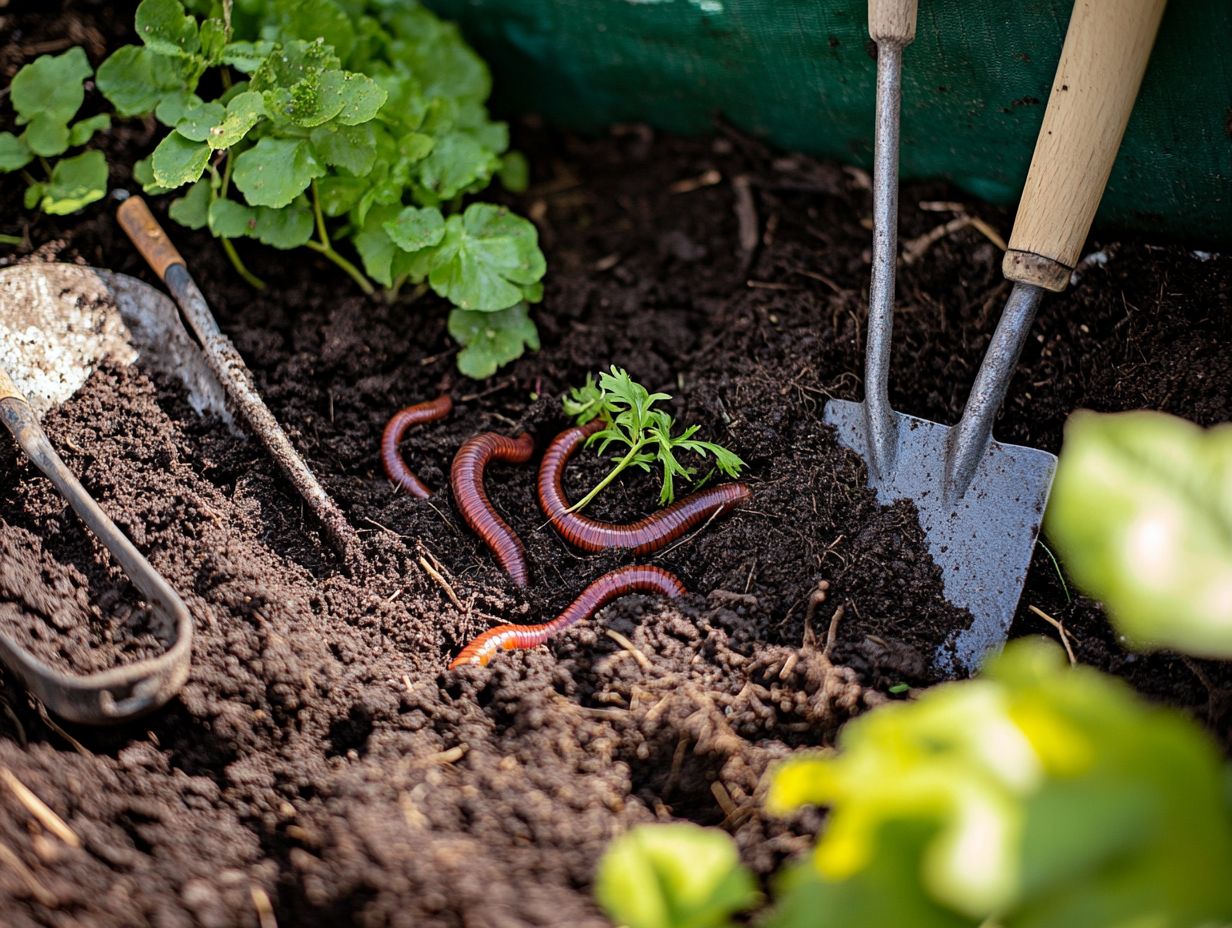
- Learn why healthy soil is the key to a successful garden.
- Spot the signs of unhealthy soil and tackle common problems to boost its quality.
- Maintain soil health through long-term care and choosing the right plants for your specific soil conditions.
Understanding Soil Health
Understanding soil health is crucial for cultivating a flourishing home garden. It requires you to evaluate the soil ecosystem and consider how elements like organic matter, soil nutrients, and biological activity influence plant growth and overall garden productivity.
Healthy soil nurtures beneficial microorganisms and earthworms, which play vital roles in the way nutrients move and change in the soil and enhancing soil fertility. Healthy soil prevents soil compaction and erosion, ensuring optimal moisture retention and a robust structure.
The Importance of Healthy Soil for Gardening
Healthy soil is the cornerstone of a flourishing home garden, providing the essential nutrients your plants need to thrive while fostering sustainable gardening practices that enhance biodiversity and the overall ecosystem.
By cultivating rich organic matter through techniques like composting, you can significantly elevate soil fertility. This ensures that your plants receive everything they require for optimal growth. Well-structured soil, often enriched with organic fertilizers, allows for improved moisture retention. This means less frequent watering and reduced drought stress for your garden.
A vibrant community of beneficial microorganisms in healthy soil breaks down organic material and makes nutrients readily available, such as nitrogen and phosphorus, promoting strong plant health. These natural allies diligently work to create a balanced ecosystem that not only benefits your plants but enhances the entire garden experience.
Signs of Unhealthy Soil
Recognizing the signs of unhealthy soil is essential for nurturing a thriving garden, where effective weed control can also play a role. Pay attention to indicators like poor soil structure, low pH levels, insufficient moisture retention, and evidence of erosion.
Each of these factors can significantly hinder plant growth and compromise the overall health of your soil.
Identifying Common Soil Issues
Identifying common soil issues, such as nutrient deficiencies, poor texture, and insufficient organic matter, is essential for restoring soil health and ensuring your garden flourishes.
When nutrient deficiencies arise, whether due to a lack of nitrogen or phosphorus, you may notice plants exhibiting stunted growth, yellowing leaves, or disappointing flowering. For instance, a garden suffering from nitrogen deficiency might show slow growth and pale foliage, while phosphorus deficiency often manifests as dark green leaves accentuated with reddish-purple undertones.
Compacted soil can significantly hinder root development, making it challenging for plants to access the water and nutrients they need. A dearth of organic matter can also reduce microbial activity and poor soil structure.
To tackle these concerns effectively, conducting soil tests can provide invaluable insights into nutrient levels, soil pH, and texture. This allows you to make targeted amendments that enhance fertility and promote overall plant health, ensuring your garden thrives.
Improving Soil Health
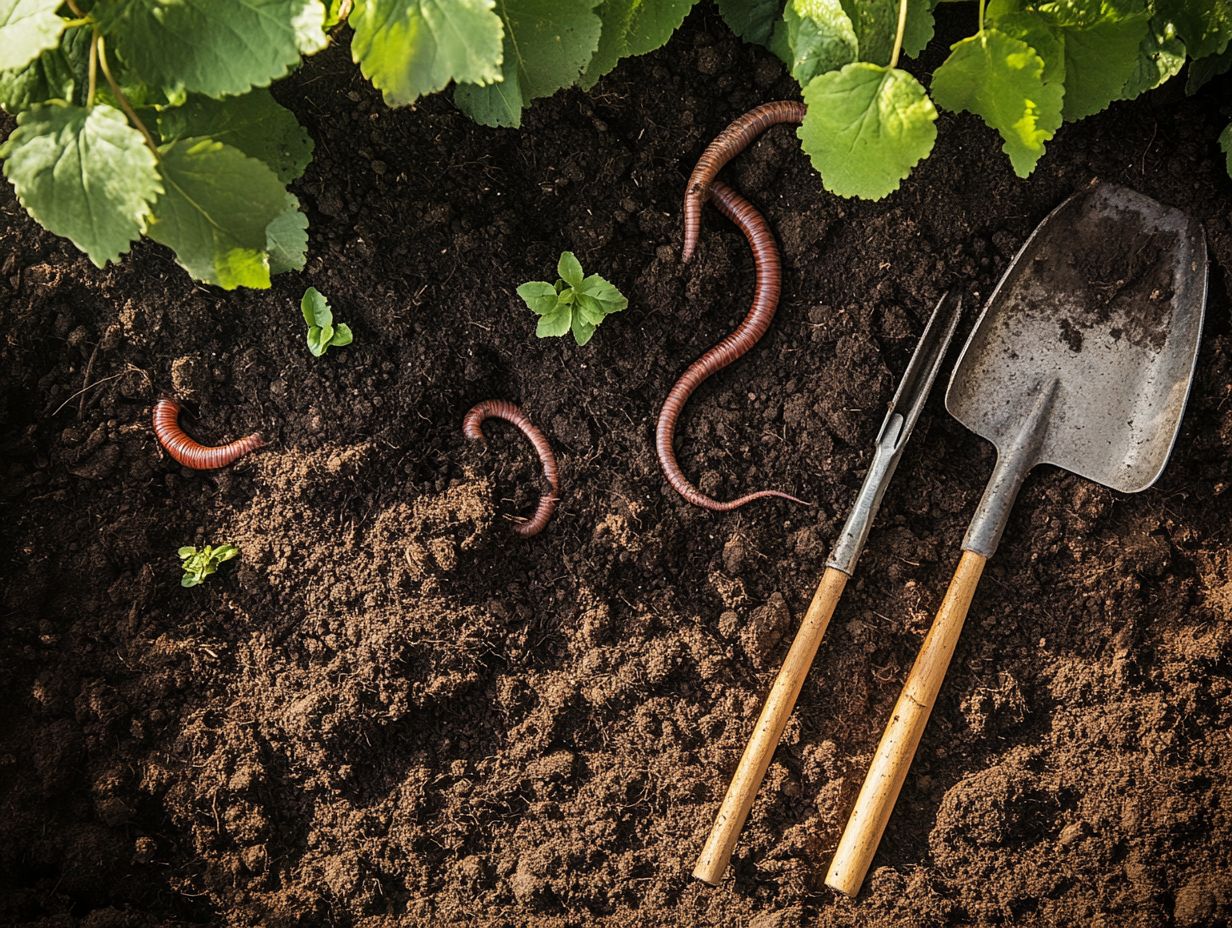
Improving soil health is essential for any gardener who aspires to cultivate nutrient-rich soil that fosters vibrant plant growth.
Employ effective strategies such as conducting a soil test and using:
- organic amendments
- compost
- cover crops
- organic mulch
These methods boost soil health and create a thriving garden ecosystem. They enhance both soil fertility and structure, laying the groundwork for a diverse soil community.
Methods for Enhancing Soil Quality
You can enhance soil quality through several effective methods, such as applying organic fertilizers, improving soil moisture retention, and fostering a community of beneficial microorganisms that contribute to a thriving soil biology.
These techniques nourish your plants and support the ecosystem within your garden, encouraging biodiversity. For example, organic fertilizers release nutrients gradually, minimizing the risk of runoff and pollution essential for maintaining environmental health. By implementing proper watering practices, you ensure stable moisture levels, allowing your plants to flourish while reducing the chances of soil erosion or compaction.
Creating habitats for beneficial insects and microorganisms promotes a natural balance, bolstering your plants’ resilience against pests and diseases. Act now to boost biological activity and create a thriving ecosystem just below the surface!
Choosing the Right Plants for Your Soil
Selecting the right plants for your soil conditions is crucial for cultivating a flourishing garden. By understanding the feel of the soil whether it s sandy, clay, or loamy you can make informed choices about which plants will thrive in your unique environment and enhance soil fertility.
This understanding gives you the power to create a vibrant garden that reflects both beauty and health.
Matching Plants to Soil Conditions
To cultivate healthy plants, align specific plant species with their ideal soil conditions. Pay close attention to factors like soil fertility, soil structure, and how nutrients move through the soil.
By understanding soil texture, pH levels, and drainage capabilities, you gain valuable insights into which plants are most likely to flourish in your space. For example, clay soils hold moisture but can stifle root growth. On the other hand, sandy soils provide excellent drainage but often lack essential nutrients.
To boost soil fertility, consider incorporating organic matter like compost; it dramatically enhances the nutrient profile, creating a vibrant environment for various plant species. Using cover crops prevents erosion and improves soil structure, which benefits future plant growth by replenishing nutrients and fostering biodiversity in your garden.
Maintaining Soil Health
Keeping your soil healthy is an ongoing journey that pays off big! It requires implementing best practices in garden maintenance and soil management.
By doing so, you promote biological activity and foster a thriving ecosystem just beneath the surface.
Best Practices for Long-Term Soil Care
Ready to supercharge your garden’s soil? Implementing best practices for long-term soil care is essential for your sustainable gardening efforts, integrating environmentally friendly gardening methods whenever possible. Focus on techniques that nurture soil life and attract beneficial insects. These methods enrich the soil. They create a thriving environment for important tiny organisms, beneficial insects, and pollinators.
One effective method is using organic mulch. Not only does it conserve moisture, but it also creates a nutrient-rich habitat that encourages beneficial organisms. Start composting your scraps today to supercharge your soil fertility while reducing your reliance on synthetic fertilizers.
Another key practice is to minimize soil compaction. Avoid heavy machinery and consider incorporating cover crops that improve soil structure over time. These practices foster a thriving environment for vital microorganisms and ultimately lead to healthier plants and a more resilient garden ecosystem.
Organic vs. Inorganic Soil Amendments
Grasping the distinctions between organic and inorganic soil amendments is essential for optimizing soil fertility and ensuring your garden flourishes while maintaining healthy soil life. Each type brings its own unique benefits and applications, influencing the nutrients your plants require for healthy growth.
Understanding the Differences and Benefits
Organic soil amendments, such as organic compost, enhance soil biology. They provide essential nutrients for your plants, including key elements like potassium (K). In contrast, inorganic soil amendments deliver immediate nutrient availability and offer specific advantages for soil fertility.
Both types of amendments are vital in maintaining and improving soil health, each playing a unique role in the soil ecosystem. Organic amendments enrich your soil by fostering microbial activity and improving its structure, enhancing water retention and aeration. For instance, Penn State Extension highlights how compost contributes to building soil organic matter, leading to better nutrient retention.
On the other hand, inorganic amendments, including various fertilizers, supply immediate nitrogen (N), phosphorus (P), and potassium key nutrients plants need for plant growth. According to Cornell University, these amendments can quickly remedy nutrient deficiencies, ensuring your crops get the support they need during critical growth phases.
Ultimately, by judiciously utilizing both organic and inorganic options, you can achieve a balanced approach that promotes sustainable gardening and effective environmentally friendly gardening methods.
Composting for Soil Health and Soil Biology
Composting is an exceptional practice that significantly enhances soil health. By transforming organic waste into nutrient-rich compost, you not only boost soil fertility but also foster the growth of beneficial microorganisms. This process further improves moisture retention in your home garden, creating an ideal environment for healthy plants to thrive.
How to Create and Use Compost in Your Garden
Creating compost is a fantastic way to boost your garden’s health! It enhances soil health while nurturing beneficial microorganisms by providing them with the organic matter they need to thrive, contributing to a healthy soil community.
To embark on your composting journey, start by selecting the right materials. A balanced mix of brown materials, like dry leaves, and green materials, such as kitchen scraps, sets the foundation for success. It s crucial to maintain your compost pile by ensuring it remains well-aerated and damp, turning it regularly to accelerate decomposition.
Monitoring temperature and moisture levels will further fine-tune the process, ensuring organic matter breaks down efficiently. Once your compost is ready, you can incorporate it into your garden beds with ease. By mixing it into the topsoil, you ll improve its structure and nutrient content, maximizing the benefits for your overall soil health.
Frequently Asked Questions
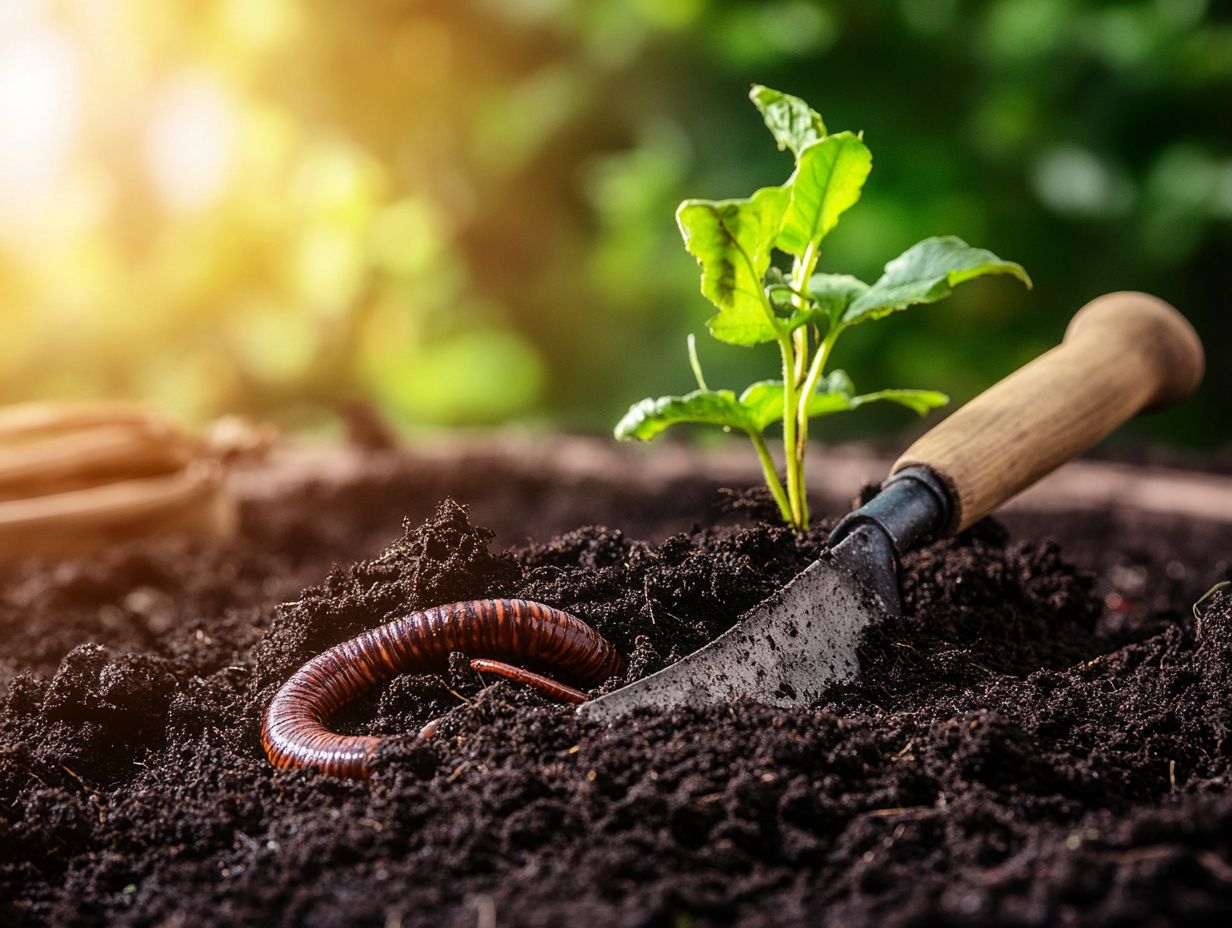
What are the best practices for maintaining garden soil health?
A few key practices for maintaining garden soil health include regularly adding organic matter, testing the soil pH and nutrient levels, rotating crops, and implementing perennial plants for soil health, along with practicing proper watering and drainage techniques.
How often should I add organic matter to my garden soil?
Add organic matter to your garden soil every year. This can include organic compost, manure, or other organic materials to enhance soil fertility.
Why is it important to test the soil pH and nutrient levels?
Testing the soil pH and nutrient levels provides valuable information about the health and fertility of your soil. This helps you determine if any changes are needed to ensure optimal plant growth.
What are the benefits of rotating crops?
Rotating crops prevents nutrient depletion and disease build-up in the soil. It also improves the overall health of your garden by promoting biodiversity and reducing pest problems.
How can I improve drainage in my garden soil?
Want better drainage in your garden? Here s how! You can add organic matter, such as compost, to loosen compacted soil. Avoid over-watering, and consider using raised beds or containers to help with drainage.
Is it necessary to fertilize garden soil?
It depends on the specific needs of your soil and plants. Some soils may require regular fertilization to replenish nutrients, while others may not need it as often. Test your soil and plants to determine the best fertilization schedule.

